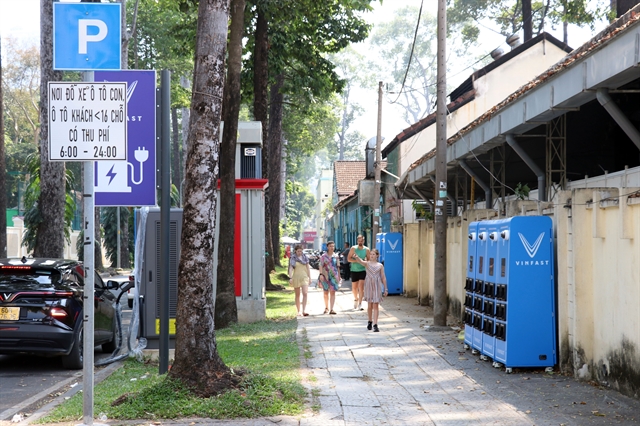 Talking Shop
Talking Shop


|
| Nguyễn Đăng Hùng, head of the Fintech Club Việt Nam under the Việt Nam Banks Association. |
Chip card transactions via the National Payment Corporation of Việt Nam (NAPAS) system nearly tripled in 2022, while the proportion of cash withdrawals processed through the NAPAS system decreased by half, as people transition from cash to other payment methods such as transfer, QR code scanning, swiping cards or using e-wallets. This result is thanks to the strong digital transformation in the payment field in the past years.
Nguyễn Đăng Hùng, head of the Fintech Club Việt Nam under the Việt Nam Banks Association, speaks to the Vietnam News Agency about this development.
How effective has digital transformation been in the payment field in recent years?
According to the State Bank of Việt Nam, non-cash payment transactions in 2022 increased by 85 per cent in volume and 31 per cent in value.
It can be seen that the transaction value and quantity are different, and there are many transactions with low values. But this low value is not a worry and is actually good news. Low-value transactions prove that people have used more non-cash payments than before.
It shows the strong growth rate of electronic transaction channels such as the internet, mobile phones, and QR code scanning.
The State Bank said the growth rate of electronic transactions reached 89 per cent via the internet and even gained triple-digit growth via mobile phones and QR code scanning. That means people are increasingly familiar with cashless payment methods and the use of cashless.
There are many concerns that when financial technology (fintech) companies are established, it will pressure the banking industry greatly. What is the current reality?
There is a view that establishing fintech companies will create competition with the banking sector. Still, I think establishing fintech companies will create cooperation, not competition, with the banking industry. They could have a synergy of strengths with partners and minimise their weaknesses.
Việt Nam has three fintech unicorns, with each value at over US$1 billion. These three companies have payment centres, including MOMO, VNPay, and ZaloPay.
Momo is an app that provides e-wallet services for tens of millions of Vietnamese people. MOMO has close cooperation with banks.
The second is VNPay. VNPay is a company licensed by the State Bank as a payment intermediary. It has many payment services related to QR code scanning and various other payment services based on mobile banking platforms. VNPay also has close cooperation with banks.
ZaloPay is also a payment intermediary based on the chat network - Zalo, as well as VNG Corporation, a billion-dollar technology company in Việt Nam.
The success of these three payment centres is based on close cooperation with banks.
NAPAS provides national payment infrastructure for all banks. It is also indispensable for the cooperation and sharing of the infrastructure between the banks themselves and the fintech companies.
In addition, there is the lending sector, including consumer finance companies such as FE credit or some other consumer lending companies and banks' lending companies.
These companies all have close cooperation with banks. For example, FE credit cooperates with VPBank and Vietcredit cooperates with Viet Capital Bank. Fintech companies and banks cooperate among them to take advantage of banks' capital, experience and technology from the fintech firms.
High-tech crime is increasing. Is this the biggest challenge for banks and fintech companies in the digital transformation progress?
When banks and financial companies deploy digital transformation or launch new services using financial and banking technology, there are requirements for cybercrime prevention and combat.
Companies are willing to invest in biometric technology to ensure that the right users use these services. There are often vulnerability scanning and cooperation with different cybersecurity companies to prevent high-tech crimes.
However, if the user is not worrying when sharing a pin code or transferring money to a stranger, there is no way to prevent deceptive crimes using high-tech. Even if the investment in technology and security measures is so large.
Therefore, banks and financial companies need to coordinate with the media to share information about guidance on using high-tech banking services with the users and their customers. Then, they could recognise the dangers and risks of using such high-tech services and protect themselves.
What is the growth potential of digital payment and the digital ecosystem in Việt Nam?
Việt Nam's developing economy has shifted from agriculture to industry and services. This brings a huge development opportunity for the digital transformation field, optimising all activities in the social-economic development.
The government's national digital transformation programmes have set targets that the digital economy will account for 20 per cent of GDP by 2025 and 30 per cent by 2030.
According to a forecast by the International Monetary Fund (IMF), Việt Nam's economy will rise to the third position in the ASEAN region by 2025 with a GDP of about $570 billion.
That means in 2025, the digital economy will reach a value of about $114 billion, or 20 per cent of $570 billion. This is an extremely large number, showing the great potential in digital transformation and the digital payment field for all businesses.
In addition, the Government has licensed Mobile Money with the expectation that mobile money services will be popular in cities and can reach remote and rural areas.
The most recent is payment services using QR codes. This is the story of financial universalisation not only in the city, big markets and supermarkets but also in night markets and tourist areas in rural and remote areas. The use of QR code payment methods has the support of the internet and mobile phones.
It is expected a great development of digital transformation in rural areas as well as in the agricultural sector.
What do banks, fintech companies, and payment intermediaries need to do to take advantage of that opportunity effectively?
The banks and payment intermediary companies have an important role in the payment stage of the digital transformation value chain.
For example, Việt Nam has level-4 public service payment with an online payment service. With level-3, people still have to go towards and the State treasury to pay cash.
With the payment of social insurance and pensions, people only need to provide their account numbers, and they can check their money through the internet or mobile devices anywhere.
Payment plays an important role in the digital transformation process.
Those show that banks and payment intermediaries have taken full opportunities to promote the development of digital transformation.
If the banks and payment intermediaries have significant investments in technology, innovate technology and quickly deploy new digital applications, they will succeed in taking the most of the opportunities to develop digital payment.
What are your proposals to solve the current difficulties to accelerate the digital transformation in the fintech and banking sectors?
The Government has issued a national digital transformation programme by 2025 with a vision to 2030. The Government is willing to create policies so that the fintech companies can test the new technologies.
In the payment sector, the State Bank has developed a new draft decree providing a controlled testing mechanism (sandbox) for fintech activities in the banking industry.
Currently, Việt Nam has 154 fintech companies, of which about 50 fintech companies are payment intermediaries managed by the State Bank.
Fintech companies and banks hope this draft decree will be issued soon to protect their customers from risks in payment services.
For the draft of Decree 101 on non-cash payments, a law in the field of payment, the State Bank is compiling a draft on amending many items in this decree, including cross-border payments and banks' agencies.
If this draft is issued, I believe it will remove difficulties and create a basic legal corridor for consumer finance companies and banks to do business favourably while protecting consumers from risks. VNS




